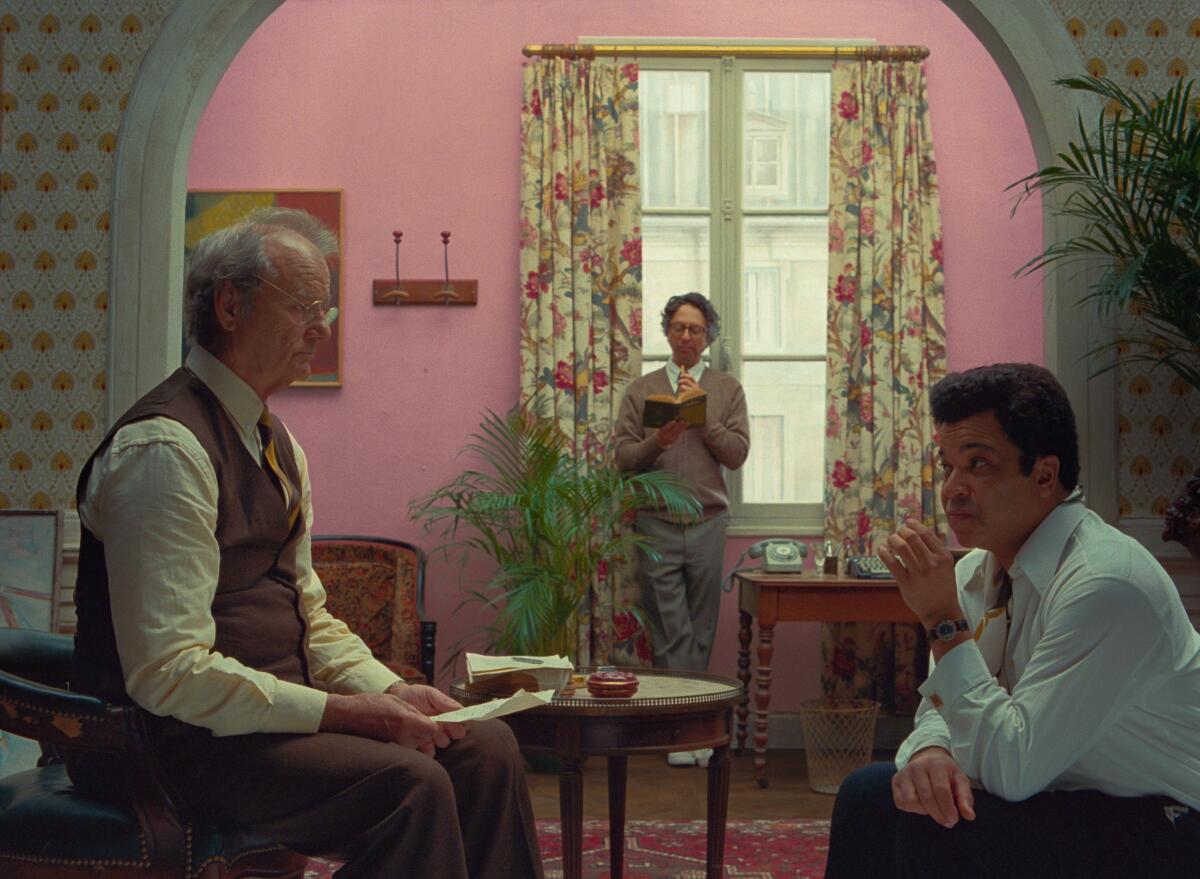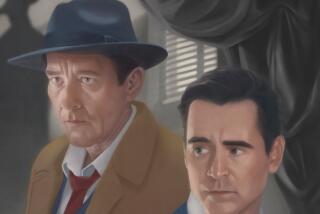Review: The grand letdown of Wes Anderson’s boorish ‘The French Dispatch’

- Share via
The Times is committed to reviewing theatrical film releases during the COVID-19 pandemic. Because moviegoing carries risks during this time, we remind readers to follow health and safety guidelines as outlined by the Centers for Disease Control and Prevention and local health officials.
Wes Anderson is undeniably the king of kitschy quirk, an auteur of the highest order in the realm of highly mannered and fastidious filmmaking. At this point, there’s no disabusing Anderson of his signature style, his films busy little dioramas stuffed to the brim with references and text and beloved character actors, so much so that the eye can barely register it all. However, his latest cinematic curio, “The French Dispatch,” demonstrates that sometimes too much of a good thing can be a pretentious bore.
“The French Dispatch” could easily be a parody of a Wes Anderson film because it is too Andersonian for its own good. It features many of his regular repertory players: Bill Murray, Owen Wilson, Jason Schwartzman, Edward Norton, Tilda Swinton, Saoirse Ronan, Tony Revolori, Adrien Brody, Frances McDormand, Léa Seydoux and Wally Wolodarsky, plus some new pals: Timothée Chalamet, Benicio del Toro, Elisabeth Moss and Jeffrey Wright. The pans are lateral, the tilts are vertical, the compositions themselves crammed and cramped with visual information, requiring so much labor in order to discern every detail that it’s possible the eyes and brain might just reject the task at hand.
It doesn’t help that the film, structured in a series of episodic vignettes each representing a magazine article, doesn’t offer an emotional throughline in the form of a protagonist. On a macro level, “The French Dispatch” is a tribute to the New Yorker magazine, the title referring to a fictional publication, an insert of the Liberty, Kansas, Evening Sun, the pet project of the publisher’s son, Arthur Howitzer Jr. (Bill Murray). Headquartered in the fictional French village Ennui-sur-Blasé (yes, that is indeed the name), a colorful cast of journalists, critics and correspondents make up the masthead of the French Dispatch.
Each chapter follows a different piece of writing: Wilson as the bicycling journalist offers the local color of Ennui; Swinton is an art critic delivering a long lecture about a prisoner-turned-artist (Del Toro) who becomes the toast of modern Abstract Expressionism thanks to his guard lover and model (Seydoux); and incarcerated agent (Brody). McDormand is a political reporter who pens a piece about a protest movement led by a student (Chalamet) that allows Anderson the chance to play in a Parisian pop fantasy land that speaks to the Nouvelle Vague and the early films of Jean-Luc Godard. The final chapter features the food critic (Wright) on a talk show recounting the kidnapping plot in which he found himself, with a stylistic flair akin to a World War II-era French espionage thriller, inspired by Jean Renoir, plus an animated car chase.
It’s hard to be critical of a film and filmmaker that seem to have pure intentions, seeking to craft a charming love letter to the golden era of (generously funded) print media. But the tics and habits that make up Anderson’s often imitated, never duplicated aesthetic have reached the point of actively working against him in “The French Dispatch.” If he is trying to say something (and it’s unclear what that might be), all of the fuss and muss obfuscates any message, and even worse, any emotional connection to the film. This latest dispatch is indeed a profound disappointment.
Katie Walsh is a Tribune News Service film critic.
‘The French Dispatch’
Rated: R, for graphic nudity, some sexual references and language
Running time: 1 hour, 48 minutes
Playing: In limited release
More to Read
Only good movies
Get the Indie Focus newsletter, Mark Olsen's weekly guide to the world of cinema.
You may occasionally receive promotional content from the Los Angeles Times.










